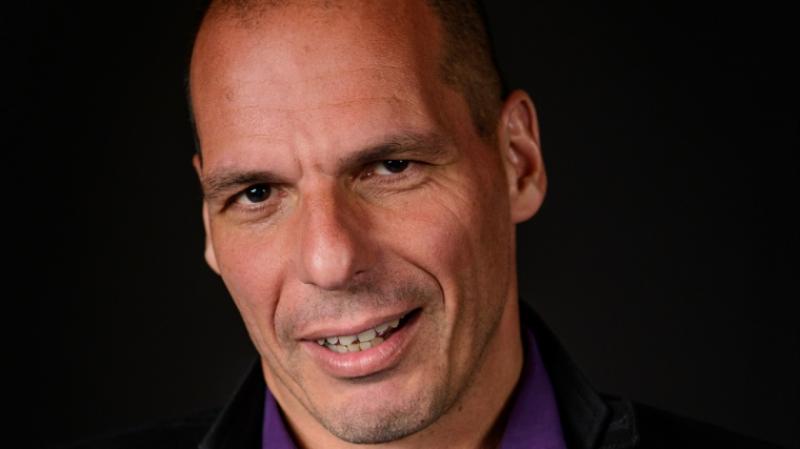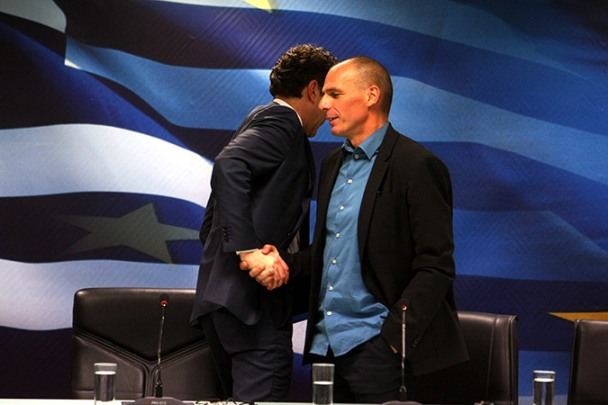Brighton Festival: Yanis Varoufakis, Brighton Dome | reviews, news & interviews
Brighton Festival: Yanis Varoufakis, Brighton Dome
Brighton Festival: Yanis Varoufakis, Brighton Dome
Star-power and myth-busting from rogue Greek economist

Maybe rock star economists are what we need. Former Greek finance minister Varoufakis’s bullish good looks, charisma and verbal fireworks failed to charm the Troika technocrats who finally banished him from government during last year’s infamous negotiations. But for this regularly applauding, sell-out crowd in Britain’s sole Green constituency he’s fascinating and, to many muttering approvingly, hugely admirable.
Interviewed by Channel 4 economics editor and Guardian columnist Paul Mason, both men speak from the left, but Varoufakis’s ideas are inclusively stimulating. He’s a little like a 2008 Brighton Festival speaker on this stage, Gore Vidal, possessing some of the late, great American radical’s amusing arrogance (the just-dumped Austrian Chancellor is “intellectually not very strong”; a former cabinet colleague was “one of the brighter ones”), and all Vidal’s contempt for received opinion’s panaceas.
Varoufakis is touring Europe to promote his new book, And the Weak Suffer What They Must?, and his would-be movement for open European democracy, Diem. His declaration that this radical change will begin in theatres and audiences such as tonight’s, not sclerotic, democracy-despising parliaments, is flatteringly optimistic. But if even a few here are transformed from chattering to activist class by his words, then he’s done what he can. Syriza’s first weeks in power are wistfully recalled as a “campaign of governmental disobedience”, though one that weakened too soon. His nation now is “withering away in the corner” after “humiliation and asphyxiation” by the Troika; as the educated young leave in their thousands, “we are being bled dry of our human capital, of our flesh and our soul, while they play their little games.” I hear an audience member complain afterwards about such “emotive” language, believing Troika negotiators couldn’t respond to such terms. But it is the profound disconnection between those in power and the human misery they frequently cause which lets our rulers sleep at night. The emotion and art of Varoufakis’s words have their place.
Syriza’s first weeks in power are wistfully recalled as a “campaign of governmental disobedience”, though one that weakened too soon. His nation now is “withering away in the corner” after “humiliation and asphyxiation” by the Troika; as the educated young leave in their thousands, “we are being bled dry of our human capital, of our flesh and our soul, while they play their little games.” I hear an audience member complain afterwards about such “emotive” language, believing Troika negotiators couldn’t respond to such terms. But it is the profound disconnection between those in power and the human misery they frequently cause which lets our rulers sleep at night. The emotion and art of Varoufakis’s words have their place.
Audience questions after Mason’s friendly interview are uniformly interesting, and answered head-on, though at such length only a fraction of those queuing at mics get to speak; the elderly gentleman left standing hunched-over at the back for 30 minutes might have expected some socialism in action from those in front. The sound-bites and aphorisms I scribble stud detailed arguments, and feel like curtains being parted on the wizard behind the bland Oz of the daily news. The intellectually woeful Brexit debate really amounts to “the English aristocracy not wanting to share their power with Brussels”; Europe’s refugee solution is “bribing an increasingly dictatorial President of Turkey to violate international law”; we are living in a “post-modern 1930s”, hopefully played out as farce this time; the wars in Georgia and Ukraine are the result of the European Union and NATO greedily trampling agreements made to Gorbachev, and NATO promising protection it never gives; the European rulers he’s met see democracy as a form of pleasant etiquette, abandoned once on the battlefield: “they loathe democracy... they like the packaging”.
These are, as always, serious times, and Varoufakis’s radical optimism is tempered by fear of a second capitalist “tsunami” hitting already damaged economies, and resurgent fascism truly taking hold. Having grown up, as he reminds us, under Greece’s fascist Colonels, he knows what that’s like. It’s been a night of intelligent plain-speaking, blowing away some of the fog of mainstream political debate, which complacently assumes nothing will or should change.
rating
Explore topics
Share this article
The future of Arts Journalism
You can stop theartsdesk.com closing!
We urgently need financing to survive. Our fundraising drive has thus far raised £49,000 but we need to reach £100,000 or we will be forced to close. Please contribute here: https://gofund.me/c3f6033d
And if you can forward this information to anyone who might assist, we’d be grateful.

Subscribe to theartsdesk.com
Thank you for continuing to read our work on theartsdesk.com. For unlimited access to every article in its entirety, including our archive of more than 15,000 pieces, we're asking for £5 per month or £40 per year. We feel it's a very good deal, and hope you do too.
To take a subscription now simply click here.
And if you're looking for that extra gift for a friend or family member, why not treat them to a theartsdesk.com gift subscription?
more
 'We are bowled over!' Thank you for your messages of love and support
Much-appreciated words of commendation from readers and the cultural community
'We are bowled over!' Thank you for your messages of love and support
Much-appreciated words of commendation from readers and the cultural community
 The Producers, Garrick Theatre review - Ve haf vays of making you laugh
You probably know what's coming, but it's such great fun!
The Producers, Garrick Theatre review - Ve haf vays of making you laugh
You probably know what's coming, but it's such great fun!
 Lammermuir Festival 2025, Part 2 review - from the soaringly sublime to the zoologically ridiculous
Bigger than ever, and the quality remains astonishingly high
Lammermuir Festival 2025, Part 2 review - from the soaringly sublime to the zoologically ridiculous
Bigger than ever, and the quality remains astonishingly high
 Frances Wilson: Electric Spark - The Enigma of Muriel Spark review - the matter of fact
Frances Wilson employs her full artistic power to keep pace with Spark’s fantastic and fugitive life
Frances Wilson: Electric Spark - The Enigma of Muriel Spark review - the matter of fact
Frances Wilson employs her full artistic power to keep pace with Spark’s fantastic and fugitive life
 Blu-ray: The Sons of Great Bear
DEFA's first 'Red Western': a revisionist take on colonial expansion
Blu-ray: The Sons of Great Bear
DEFA's first 'Red Western': a revisionist take on colonial expansion
 Spinal Tap II: The End Continues review - comedy rock band fails to revive past glories
Belated satirical sequel runs out of gas
Spinal Tap II: The End Continues review - comedy rock band fails to revive past glories
Belated satirical sequel runs out of gas
 Tosca, Welsh National Opera review - a great company reduced to brilliance
The old warhorse made special by the basics
Tosca, Welsh National Opera review - a great company reduced to brilliance
The old warhorse made special by the basics
 Not Your Superwoman, Bush Theatre review - powerful tribute to the plight and perseverance of Black women
Golda Rosheuvel and Letitia Wright excel in a super new play
Not Your Superwoman, Bush Theatre review - powerful tribute to the plight and perseverance of Black women
Golda Rosheuvel and Letitia Wright excel in a super new play
 Music Reissues Weekly: Robyn - Robyn 20th-Anniversary Edition
Landmark Swedish pop album hits shops one more time
Music Reissues Weekly: Robyn - Robyn 20th-Anniversary Edition
Landmark Swedish pop album hits shops one more time
 Album: Twenty One Pilots - Breach
Ohio mainstream superstar duo wrap up their 10 year narrative
Album: Twenty One Pilots - Breach
Ohio mainstream superstar duo wrap up their 10 year narrative
 Downton Abbey: The Grand Finale review - an attemptedly elegiac final chapter haunted by its past
Noel Coward is a welcome visitor to the insular world of the hit series
Downton Abbey: The Grand Finale review - an attemptedly elegiac final chapter haunted by its past
Noel Coward is a welcome visitor to the insular world of the hit series
 BBC Proms: Ehnes, Sinfonia of London, Wilson review - aspects of love
Sensuous Ravel, and bittersweet Bernstein, on an amorous evening
BBC Proms: Ehnes, Sinfonia of London, Wilson review - aspects of love
Sensuous Ravel, and bittersweet Bernstein, on an amorous evening

Add comment